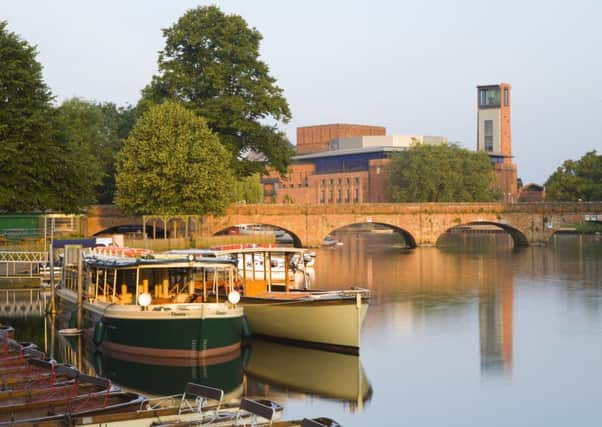Travel: Stratford-upon-Avon, Warwickshire


For most people it is probably difficult to think of Stratford-upon-Avon without also thinking of William Shakespeare, but once in the heart of the Warwickshire market town it becomes impossible to separate the two. Where there isn’t a theatre or a heritage site somehow connected with the Bard, every street corner, every shop and every pub alludes overtly or obliquely to the town’s most famous son.
Stratford-upon-Avon is not shy about celebrating the fact that it was here that Shakespeare was born, grew up, learned his craft, fell in love, married and saw out his last days. Why on Earth would it be?
Advertisement
Hide AdIt is perhaps thanks to Shakespeare that Stratford is one of the best preserved examples of a Tudor English town. For centuries, literary groupies have been making the pilgrimage here to walk where he walked, drink where he drank and see what he saw, and wise civic leaders have been endeavouring to make sure that they can do so.
There is nothing mock about the higgledy-piggledy Tudor architecture in this town, with its uneven exposed beams somehow holding in place walls that were built long before Shakespeare was born.
In Sheep Street one of the oldest houses still inhabited, Shrieves House, is said to have been the home of the inspiration for the character Sir John Falstaff. Just around the corner, a building of similar vintage is now the Mercure Stratford-upon-Avon Shakespeare Hotel.
CONNECT WITH THE SCOTSMAN
• Subscribe to our daily newsletter (requires registration) and get the latest news, sport and business headlines delivered to your inbox every morning
Unsurprisingly the hotel is warren-like, with low ceilings and narrow stairs and hallways built for a time when people were on the whole considerably smaller than they are now. Like so many things in Stratford-upon-Avon, the hotel is aimed squarely at the Shakespeare market and many of the guests appeared, like us, to be staying only for a couple of nights for a leisurely weekend taking in a bit of theatre. The rooms are all named after Shakespearean characters and the bar is called The Quill.
It’s hard to know what Falstaff would have made of the restaurant however. Instead of traditional English the hotel has opted for a Marco Pierre White New York Italian job, which seems rather out of place. Our pre-theatre meal was pleasant enough, although I’m not sure how much Marco Pierre White had to do with it. Despite the extensive array of moody black and white portraits of the mercurial chef hanging from the dining room walls, Shakespeare is the main attraction in this town and the hotel is just a five-minute walk from the Royal Shakespeare Company.
Advertisement
Hide AdPre-booking the tickets over the phone, I asked what was on. I was told there was a play by John Webster and Love’s Labour Won. “Is there no Shakespeare?” I asked, somewhat dejected. “Love’s Labour Won is Shakespeare,” came the withering reply. “Although you might know it as Much Ado About Nothing.”
As the play began I was still hung up on the hubris of changing the title to one that Shakespeare would have chosen, if only he had had the wit to think of it for himself. But I loved the spell-binding production, which is set just after the First World War. It’s all a bit confusing, a bit like one of the comedies.
Advertisement
Hide AdShakespeare is known to have written a play called Love’s Labour Won. It is thought to be a lost play, but some experts believe it was also an alternative title for Much Ado About Nothing – a kind of sequel to Love’s Labour Lost. Having neither seen nor read Love’s Labour Lost it’s hard to take a view on how credible that theory is, but the two plays are being paired in performance for the first time at the Royal Shakespeare Company using the same cast and with Love’s Labour Lost set just before the Great War. If I had planned our visit better I would have tried to get tickets for both productions, which run until March.
There must be more theatres per head of population here than anywhere else in the UK, but if you can’t get your fill of the Bard from seeing his work performed on stage there are plenty of other ways. There is his birthplace to visit along with various other houses connected with him and the church where he was baptised in 1564 and laid to rest in 1616.
Conspiracy theorists have always seized on the fact that some of the details of Shakespeare’s life are a bit sketchy. They say it adds weight to the argument that he was just a front and that the works that bear his name were actually written by a nobleman with a better education. I’ve never subscribed to this view, and spending time in Stratford-upon-Avon has reinforced that.
The Mercure Hotel is an ideal base for a visit to the town to both enjoy Shakespeare’s work and learn more about the man himself.
• Mercure Stratford-upon-Avon Shakespeare Hotel, Chapel Street, Stratford-upon-Avon CV37 6ER, room rates start from £140 per night, tel: 02477 092802, www.mercure.com; for more details about the Royal Shakespeare Company and its productions, visit www.rsc.org.uk
SCOTSMAN TABLET AND IPHONE APPS